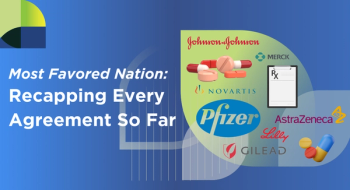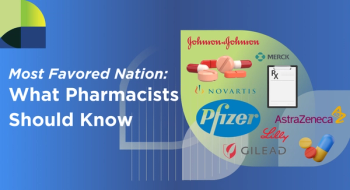
AJPB® Translating Evidence-Based Research Into Value-Based Decisions®
- AJPB November 2020
- Volume 1
- Issue 1
Lessons Learned From Kickbacks in the Pharmacy Arena
A kickback can arise if a pharmacy pays commissions to a 1099 independent contractor marketing representative who generates patients for the pharmacy who are covered by a federal health care program.
In previous Pharmacy Times
In the durable medical equipment (DME) arena, kickbacks were alleged in Operation Brace Yourself. In this example, the DME supplier pays a lead generation company, which in turn pays a telehealth company, which in turn pays a telehealth physician, who in turn writes an order for a back brace, and the order subsequently goes back to the DME supplier that started the process.
Many lead generation and telehealth companies have left the orthotics space and have entered the genetic testing space. In this example, a genetic testing lab pays a lead generation company, which in turn pays a telehealth company, which in turn pays a telehealth physician, who in turn writes an order for a lab test, and that order goes back to the genetic testing lab that started the process.
Recent Department of Justice (DOJ) press releases address kickbacks in the pharmacy space. Here are some excerpts:
- Three Charged in $180 Million Health Care Fraud and Money Laundering Scheme — “To…facilitate their scheme to defraud health care benefit programs, the defendants [owners of pharmacies] allegedly conspired to and engaged in a scheme to solicit and pay kickbacks and bribes to marketers, physicians, other medical providers, and beneficiaries to refer, prescribe, and receive prescriptions for medically unnecessary compound medications. The defendants also allegedly conspired to and engaged in a scheme to launder the proceeds of their fraudulent activity by concealing the proceeds they obtained and conducting monetary transactions of a value greater than $10,000, including the purchase of numerous assets, such as real estate, luxury automobiles, a three-carat diamond, and other high-priced goods. The charges announced…alleged schemes billing Medicare, TRICARE…and private insurance companies for medically unnecessary compounded medications.”
- Four Florida Men Charged for Their Roles in a $54 Million Compound Pharmacy Kickback Scheme — “Four Florida men were charged in an indictment…for their alleged participation in a compound pharmacy kickback scheme…The allegations stem from the defendants’ participation in a multi-million dollar conspiracy to defraud TRICARE…The indictment alleges that [the defendants] owned and operated [a pharmacy] for the purpose of targeting TRICARE beneficiaries and causing the submission to TRICARE of claims for expensive prescription compounded drugs that were not legitimately prescribed because they were induced and procured by the payment of illegal kickbacks and bribes.”
- Six Texas Pharmacy Owners and Marketers Charged in $14 Million Kickback Scheme — “Six Dallas, Texas-area pharmacy owners and marketers were charged in a superseding indictment…for their roles in a scheme involving compound drug claims to TRICARE and the US Department of Labor, the vast majority of which were the product of over $14 million in illegal kickbacks and bribes….The superseding indictment alleges that [pharmacies affiliated with the defendants] utilized the same marketers but paid them differently depending on whether they were receiving a commission on a federal or private prescription, in order to disguise the illegal kickback payments to marketers…for the referral of federal prescriptions. These marketers were allegedly set up as sham W-2 employees to appear as though they were bona fide employees.”
Pharmacies can derive 6 important lessons from these pharmacy takedowns:
1. Every Employee is a Potential Whistleblower
If a pharmacy is doing something it should not be doing, then someone knows about it. That someone is usually an employee. Virtually all employees are aware of whistleblower lawsuits. If an employee witnesses fraudulent actions by their employer, then the employee may be motivated to gather information and then hire an attorney who specializes in filing whistleblower lawsuits.
The lawsuit will be in the name of the employee and also in the name of the United States. The lawsuit will be filed in federal court and it will “go under seal.” This means that no one knows about the lawsuit except for the government.
A civil Assistant US Attorney (AUSA) will review the lawsuit and will likely appoint agents to investigate the allegations set out in the lawsuit. This investigation may take 6 to 12 months. After the investigation is completed—or even if it is still ongoing—if the AUSA concludes that the whistleblower lawsuit has merit, then the DOJ will intervene.
This means that the DOJ will take over prosecuting the lawsuit and the employee (and his/her attorney) can pretty much “sit on the sidelines.” It is at this time that the lawsuit is unsealed and is served on the employer.
The lawsuit is based on violation of the federal False Claims Act. Normally, whistleblower lawsuits are settled, with the relator receiving 15% to 20% of the settlement proceeds.
If the civil AUSA concludes that the facts indicate that a crime was committed, then the civil AUSA will hand the file over to a criminal AUSA to determine if, in addition to the civil allegations set out in the whistleblower lawsuit, the DOJ wants to bring criminal charges against the employer.
2. A Kickback Results in a False Claim
Most pharmacies understand that if they bill for a product not delivered—or deliver one type of product and deliver another type of product—then a false claim arises. Equally as important, however, is that if a pharmacy is engaged in a kickback arrangement, then claims that ultimately arise out of that arrangement are also false claims.
3. Products and Services That Are Not Medically Necessary
By analogy, let’s discuss the example of back braces in the DME space. For decades, Medicare beneficiaries got along just fine without back braces. And then beginning about 5 years ago, a huge number of beneficiaries received back braces.
Was this spike in demand driven by the medical needs of the beneficiaries—or was this spike driven by lead generation companies (LGCs), the DME suppliers that paid the LGCs, sham telehealth companies, and telehealth physicians? The answer is obvious.
The lesson for pharmacies is that if they aggressively enter a particular market, it is important that their business model be legally compliant. The bottom line is that if a pharmacy finds itself submitting a large number of claims for products and/or services that were not used very much in the past, the pharmacy will likely be subjected to scrutiny.
4. Large Claims Submissions Invite Scrutiny
Third party payers (TPPs) have edits in place that spot claims submissions that are “out of the ordinary.” Examples of out of the ordinary claim submissions are:
- A pharmacy has a history of submitting claims at a historically established dollar level and for particular products. But then the TPP notices a spike in the dollar amount of claims submissions for a particular product.
- A pharmacy submits a noticeably greater number of claims for a particular product category than other pharmacies.
5. Avoid Sham Clinical Trials
As the old Charles Schwab commercial used to say: “You can put lipstick on a pig, but it is still a pig.” This phrase applies to fraudulent arrangements. At the end of the day, a pharmacy cannot hide fraud.
The pharmacy may attempt to disguise the fraud, but eventually the existence of fraud will come out. This is true with sham clinical trials.
A legitimate clinical trial can be one that is connected to a hospital, connected to a medical school, and/or overseen by an Institutional Review Board. A sham clinical trial is one that is merely a subterfuge designed to funnel money to referring physicians.
6. 1099 Independent Contractor Marketing Reps
The AKS prohibits a pharmacy from giving anything of value (eg, commissions) to persons/entities in exchange for referring patients covered by an FHCP, arranging for the referral of FHCP patients, or recommending the purchase of a product or service covered by an FHCP.
If a pharmacy pays commissions to 1099 independent contractor marketing representatives for generating FHCP patients, then the AKS is likely violated. The safest course of action is for marketing representatives to be bona fide employees of the pharmacy. A pharmacy can pay to a W2 employee marketing representative a base salary plus discretionary bonuses based on a number of factors.
Jeffrey S. Baird, JD, is Chairman of the Health Care Group at Brown & Fortunato, PC, a law firm with a national health care practice based in Texas. He represents pharmacies, infusion companies, HME companies, manufacturers and other health care providers throughout the United States. Mr. Baird is Board Certified in Health Law by the Texas Board of Legal Specialization, and can be reached at (806) 345-6320 or
Articles in this issue
about 5 years ago
The Importance of Provider Status for Pharmacistsabout 5 years ago
Patient Assistance Programs: The Good, the Bad, and the UglyNewsletter
Stay informed on drug updates, treatment guidelines, and pharmacy practice trends—subscribe to Pharmacy Times for weekly clinical insights.


























